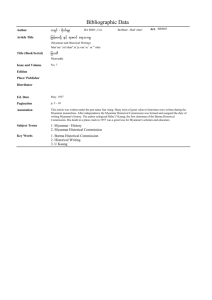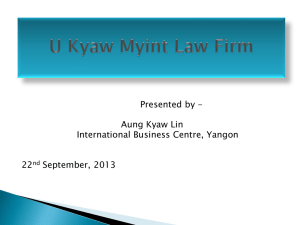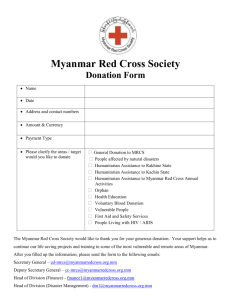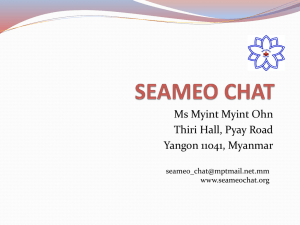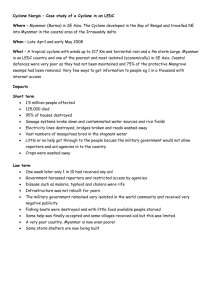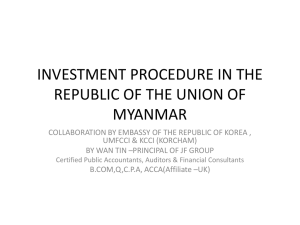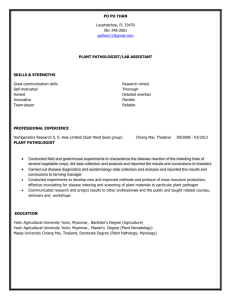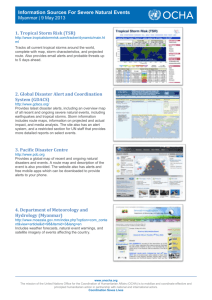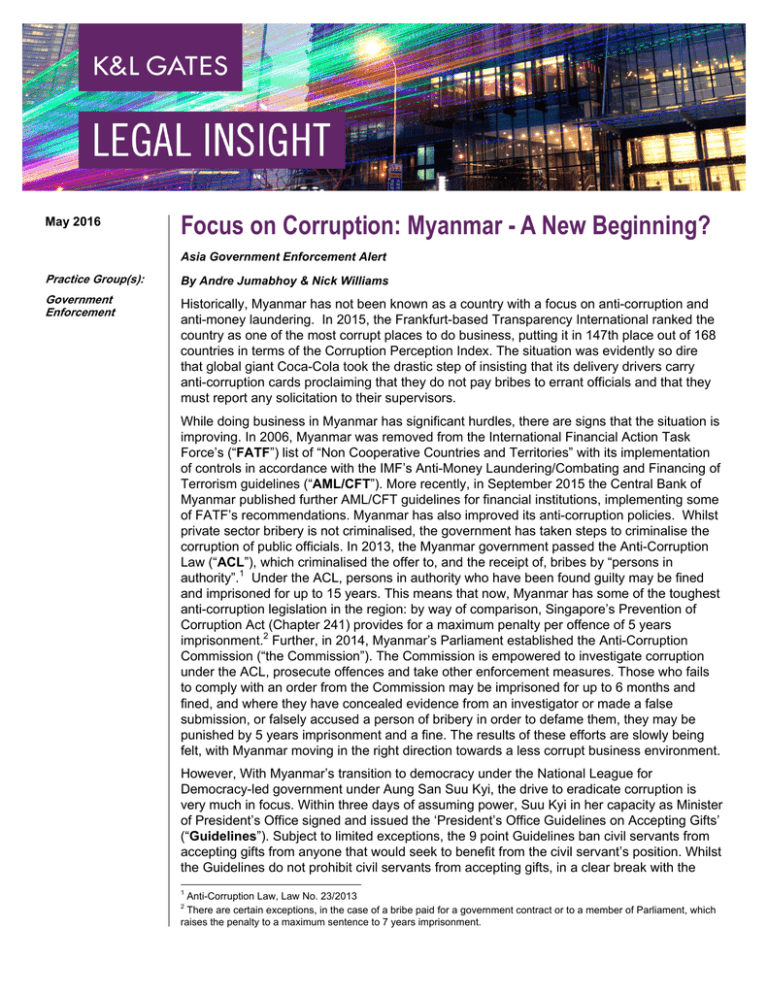
May 2016
Focus on Corruption: Myanmar - A New Beginning?
Asia Government Enforcement Alert
Practice Group(s):
By Andre Jumabhoy & Nick Williams
Government
Enforcement
Historically, Myanmar has not been known as a country with a focus on anti-corruption and
anti-money laundering. In 2015, the Frankfurt-based Transparency International ranked the
country as one of the most corrupt places to do business, putting it in 147th place out of 168
countries in terms of the Corruption Perception Index. The situation was evidently so dire
that global giant Coca-Cola took the drastic step of insisting that its delivery drivers carry
anti-corruption cards proclaiming that they do not pay bribes to errant officials and that they
must report any solicitation to their supervisors.
While doing business in Myanmar has significant hurdles, there are signs that the situation is
improving. In 2006, Myanmar was removed from the International Financial Action Task
Force’s (“FATF”) list of “Non Cooperative Countries and Territories” with its implementation
of controls in accordance with the IMF’s Anti-Money Laundering/Combating and Financing of
Terrorism guidelines (“AML/CFT”). More recently, in September 2015 the Central Bank of
Myanmar published further AML/CFT guidelines for financial institutions, implementing some
of FATF’s recommendations. Myanmar has also improved its anti-corruption policies. Whilst
private sector bribery is not criminalised, the government has taken steps to criminalise the
corruption of public officials. In 2013, the Myanmar government passed the Anti-Corruption
Law (“ACL”), which criminalised the offer to, and the receipt of, bribes by “persons in
authority”.1 Under the ACL, persons in authority who have been found guilty may be fined
and imprisoned for up to 15 years. This means that now, Myanmar has some of the toughest
anti-corruption legislation in the region: by way of comparison, Singapore’s Prevention of
Corruption Act (Chapter 241) provides for a maximum penalty per offence of 5 years
imprisonment.2 Further, in 2014, Myanmar’s Parliament established the Anti-Corruption
Commission (“the Commission”). The Commission is empowered to investigate corruption
under the ACL, prosecute offences and take other enforcement measures. Those who fails
to comply with an order from the Commission may be imprisoned for up to 6 months and
fined, and where they have concealed evidence from an investigator or made a false
submission, or falsely accused a person of bribery in order to defame them, they may be
punished by 5 years imprisonment and a fine. The results of these efforts are slowly being
felt, with Myanmar moving in the right direction towards a less corrupt business environment.
However, With Myanmar’s transition to democracy under the National League for
Democracy-led government under Aung San Suu Kyi, the drive to eradicate corruption is
very much in focus. Within three days of assuming power, Suu Kyi in her capacity as Minister
of President’s Office signed and issued the ‘President’s Office Guidelines on Accepting Gifts’
(“Guidelines”). Subject to limited exceptions, the 9 point Guidelines ban civil servants from
accepting gifts from anyone that would seek to benefit from the civil servant’s position. Whilst
the Guidelines do not prohibit civil servants from accepting gifts, in a clear break with the
1
Anti-Corruption Law, Law No. 23/2013
There are certain exceptions, in the case of a bribe paid for a government contract or to a member of Parliament, which
raises the penalty to a maximum sentence to 7 years imprisonment.
2
Focus on Corruption: Myanmar - A New Beginning?
past, the value of each individual gift must not exceed 25,000 kyats (USD $20) and restrict
the gifts received from an individual or organisation to not more than 100,000 kyat (USD$80)
in a year.
The limited exceptions are:
a. Where the gifts are given during recognised holidays such as Christmas and the
Buddhist celebration of Thadingyut, and must not exceed 100,000 kyats; or
b. Where gifts are given on account of a familial or personal relationship.
The Guidelines also make it permissible for civil servants to accept gifts from foreign
governments worth more than 400,000 kyats (USD$320), as well as money from foreign
governments for travel, medical expenses or scholarships.
Whilst the Guidelines represent an important break with the past, the exceptions still provide
many loopholes that effectively undermine rigorous enforcement. Given the perception of the
institutional nature of corruption in Myanmar, an outright ban may have proved a bridge too
far; thus, an incremental approach of establishing new norms may well be a more effective
approach. What is most welcoming is the new government’s determination to enforce the
Guidelines, beginning with the public disclosure on 21 April of an unidentified media
company that was notified of its violation of the Guidelines when it gave a gift of 5 million
kyats (USD $4237) in cash to an assistant of an important official during the Buddhist new
year ceremony. The government stated that the money would not be returned but instead
used for social projects.
Institutional investors in Myanmar should carefully review the Guidelines when putting in
place their own anti-corruption policies. Those entities which fall under the jurisdiction of the
Foreign Corrupt Practices Act or the UK Bribery Act may still wish to consider adopting a
zero-tolerance approach to gift giving in Myanmar. Even though such gifts are still
permissible under the Guidelines, they may well fall foul of the US or UK legislation.
It will be interesting to watch the development of the law in the anti-corruption space in
Myanmar, in particular the judiciary’s interpretation of the Guidelines. And despite the
ongoing development in anti-corruption law, foreign businesses operating in Myanmar must
keep in mind that there are still significant risks associated with doing business in Myanmar.
This publication/newsletter is for informational purposes and does not contain or convey
legal advice. The information herein should not be used or relied upon in regard to any
particular facts or circumstances without first consulting a lawyer.
Authors:
Andre Jumabhoy
andre.jumabhoy@klgates.com
+65.6507.8189
Nick Williams
nick.williams@klgates.com
+65.6507.8117
2
Focus on Corruption: Myanmar - A New Beginning?
Anchorage Austin Beijing Berlin Boston Brisbane Brussels Charleston Charlotte Chicago Dallas Doha Dubai Fort Worth Frankfurt
Harrisburg Hong Kong Houston London Los Angeles Melbourne Miami Milan Moscow Newark New York Orange County Palo Alto Paris
Perth Pittsburgh Portland Raleigh Research Triangle Park San Francisco São Paulo Seattle Seoul Shanghai Singapore Spokane
Sydney Taipei Tokyo Warsaw Washington, D.C. Wilmington
K&L Gates comprises more than 2,000 lawyers globally who practice in fully integrated offices located on five
continents. The firm represents leading multinational corporations, growth and middle-market companies, capital
markets participants and entrepreneurs in every major industry group as well as public sector entities, educational
institutions, philanthropic organizations and individuals. For more information about K&L Gates or its locations,
practices and registrations, visit www.klgates.com.
This publication is for informational purposes and does not contain or convey legal advice. The information herein should not be used or relied upon in
regard to any particular facts or circumstances without first consulting a lawyer.
© 2016 K&L Gates LLP. All Rights Reserved.
3

